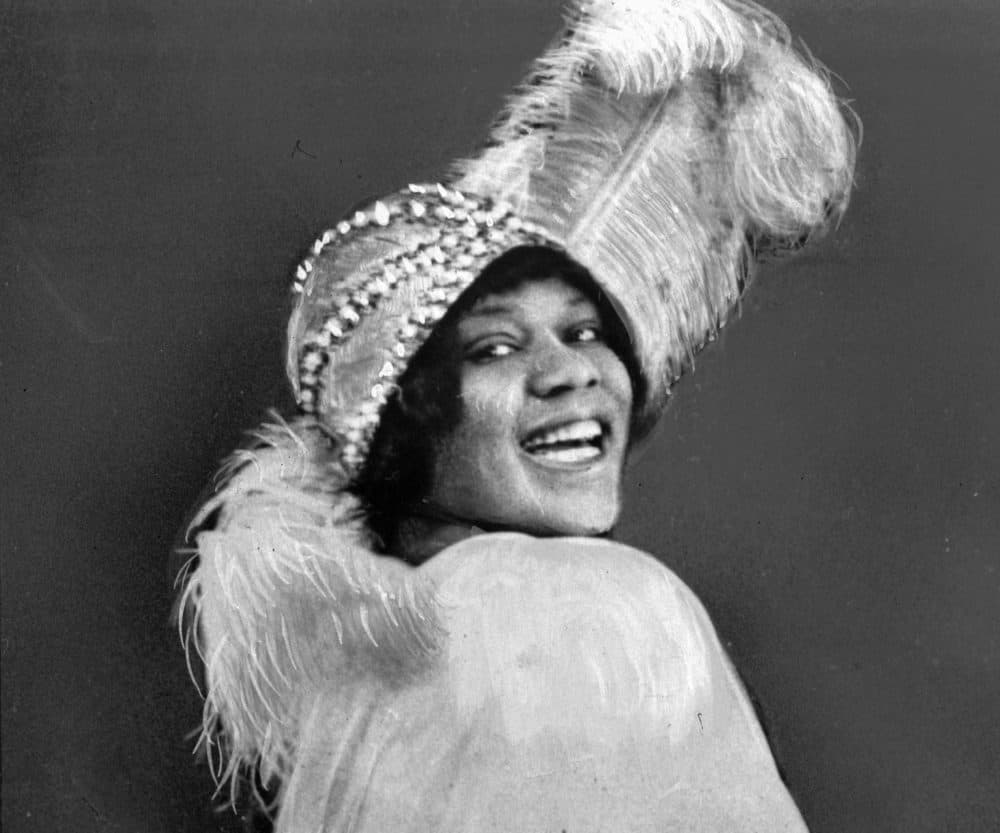Advertisement
'Her Voice Is Needed Now': The Cabot Honors Blues Legend Bessie Smith

Bessie Smith is known now as the “Empress of the Blues.” The Tennessee native rose to greatness through the 1920s and ‘30s and was one of the first blues singers to make a record. Her first effort, “Downhearted Blues,” hit the top of Billboard’s chart in 1923. She was inducted into the Rock & Roll Hall of Fame (in the “early influences” category) and received the Grammy Hall of Fame’s “Lifetime Achievement Award” in 1989.
On Tuesday, Dec. 4, Smith’s legacy will be honored at The Cabot theater in Beverly. Nona Hendryx, Shemekia Copeland, Doyle Bramhall II, Valerie Simpson, Meshell Ndegeocello, Terri Lyne Carrington, Don Flemons and The Western Den (Deni Hlavinka and Chris West) will each be performing one of Smith’s songs and one of their own, or a cover song they hold dear.
The Cabot gala is raising money to continue renovating the historic theater ahead of its 100th anniversary in 2020. "When they asked me to create a musical event," says singer-songwriter Paula Cole, “I asked ‘Who was alive 100 years ago?’ and I thought Bessie. Her voice is needed now.”
Cole says there's many reasons for that.
"She’s an important voice of feminism and consciousness and humor and strength. She’s a liberated woman. She used humor as salacious metaphor for sex. She lived in the prohibition era and was a shouter in the back of speakeasies. And she also dealt with profound racism," Cole says. "She had a car accident and lacked proper care for her wound at the side of the road. She died prematurely because only a black ambulance would take her to a black hospital.”
If you’re not familiar with Smith or her music, vocalist Nona Hendryx — who came to fame with Labelle in the ‘70s and soared again later as a solo artist — can relate.
When Hendryx was in her teens, she says, “My ears were much more attuned to the bobby sock rock and rollers, people like Fats Domino, Chuck Berry maybe Little Anthony and the Imperials, not so much the women of the early blues. Bessie Smith? It’d be like talking to somebody today who’s into K-pop and you go, ‘Have you heard of Nona Hendryx?’ and they’d be like ‘What? Who is that?’ That’s how I felt about Bessie Smith. It was ancient history, ancient music.”
But Hendryx was turned onto Smith after her group, Patti LaBelle and the Blue Belles, shared the stage with R&B singer Esther Phillips at the Apollo Theater in the mid-‘60s.
“Hearing Esther’s voice really opened my ears up to that era of music,” Hendryx says. “Bessie was a fit for me because there was power in her voice and with what she accomplished, how successful she was, and how she was willing, lyrically, to talk about sex. Or even some of the things on the social and political side of her music. Although she wasn’t the writer of a lot of what she was recording, it felt very authentic.”
Singer-guitarist Doyle Bramhall, a longtime collaborator with Eric Clapton and ex-Pink Floyd bassist Roger Waters, says he knew Smith was a groundbreaking female blues artist, but didn’t really know her music.
Bramhall, from the South like Smith, had grown up with the blues. When asked to do the gala, he did a deep, satisfying dive into her music.
“I think even though her songs were metaphoric, not just blatant and literal, her stuff is really risqué and, in a way, empowering,” Bramhall says. “Because she’s a woman taking on the world in a different way and expressing herself in a way that had really never been done, in a way that reached a broader audience that crossed over racial barriers. She broke a lot of the rules of that time, which opened it up for people after her."
Bramhall understood where Smith’s lyrics were coming from, but had a revelation about the music as he tried to pick songs to play. “I realized how complicated and sophisticated her music was. There are so many passing chords and passing notes happening under the vocal — so much movement going on. It’s based on the chord progressions of that time period, but it seemed also really free within that. I ended up going with ‘Coffee Grindin’ Blues.’ ”
Cole plans to sing Smith’s “Kitchen Man.” She calls it “hysterically funny.”
“It’s talking about food as metaphor for sex. It’s raucous," she says. "You have to remember a lot of these were being sung in the climate of inebriation because of the speakeasies so the music got farther out there. Bessie is reminding me to be brave now.”
For the performance at The Cabot, Hendryx plans to perform Billie Holiday's "Strange Fruit" alongside Smith's work — speaking to the world Smith inhabited during the Jim Crow South. The song mourns and protests the lynching of African-Americans.
"I do it as much more of a dirge, in a funeral kind of way," Hendryx says. "I use some samples of Dr. King’s ‘I Had a Dream’ and there’s a vocal cry that I do in between the verses that represents the pain and the tears that people shed.”
As for Smith's catalog, Hendryx opted for what is likely her best-known song "Nobody Knows You When You’re Down and Out."
"It’s a classic," she says, “but also [pertinent] for today. There are people in this world who can identify with that. That was then and this is now but it’s still the news.”


